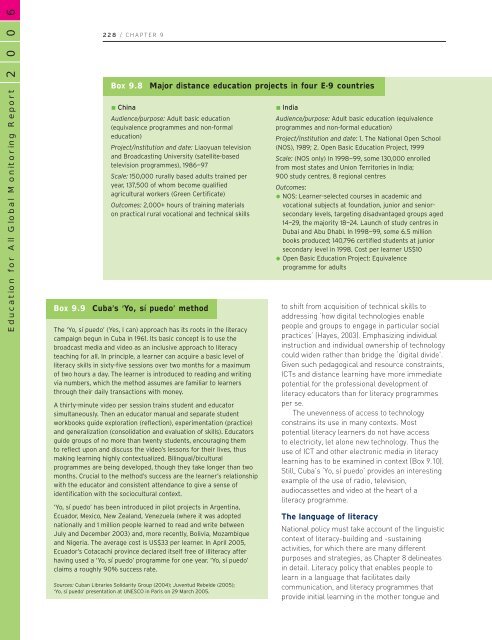literacy for life; EFA global monitoring report, 2006 - Institut de ...
literacy for life; EFA global monitoring report, 2006 - Institut de ...
literacy for life; EFA global monitoring report, 2006 - Institut de ...
Create successful ePaper yourself
Turn your PDF publications into a flip-book with our unique Google optimized e-Paper software.
0<br />
0<br />
6<br />
228 / CHAPTER 9<br />
2<br />
Education <strong>for</strong> All Global Monitoring Report<br />
Box 9.9<br />
Box 9.8<br />
Major distance education projects in four E-9 countries<br />
China<br />
Audience/purpose: Adult basic education<br />
(equivalence programmes and non-<strong>for</strong>mal<br />
education)<br />
Project/institution and date: Liaoyuan television<br />
and Broadcasting University (satellite-based<br />
television programmes), 1986—97<br />
Scale: 150,000 rurally based adults trained per<br />
year, 137,500 of whom become qualified<br />
agricultural workers (Green Certificate)<br />
Outcomes: 2,000+ hours of training materials<br />
on practical rural vocational and technical skills<br />
Cuba’s ‘Yo, sí puedo’ method<br />
The ‘Yo, sí puedo’ (Yes, I can) approach has its roots in the <strong>literacy</strong><br />
campaign begun in Cuba in 1961. Its basic concept is to use the<br />
broadcast media and vi<strong>de</strong>o as an inclusive approach to <strong>literacy</strong><br />
teaching <strong>for</strong> all. In principle, a learner can acquire a basic level of<br />
<strong>literacy</strong> skills in sixty-five sessions over two months <strong>for</strong> a maximum<br />
of two hours a day. The learner is introduced to reading and writing<br />
via numbers, which the method assumes are familiar to learners<br />
through their daily transactions with money.<br />
A thirty-minute vi<strong>de</strong>o per session trains stu<strong>de</strong>nt and educator<br />
simultaneously. Then an educator manual and separate stu<strong>de</strong>nt<br />
workbooks gui<strong>de</strong> exploration (reflection), experimentation (practice)<br />
and generalization (consolidation and evaluation of skills). Educators<br />
gui<strong>de</strong> groups of no more than twenty stu<strong>de</strong>nts, encouraging them<br />
to reflect upon and discuss the vi<strong>de</strong>o’s lessons <strong>for</strong> their lives, thus<br />
making learning highly contextualized. Bilingual/bicultural<br />
programmes are being <strong>de</strong>veloped, though they take longer than two<br />
months. Crucial to the method’s success are the learner’s relationship<br />
with the educator and consistent attendance to give a sense of<br />
i<strong>de</strong>ntification with the sociocultural context.<br />
‘Yo, sí puedo’ has been introduced in pilot projects in Argentina,<br />
Ecuador, Mexico, New Zealand, Venezuela (where it was adopted<br />
nationally and 1 million people learned to read and write between<br />
July and December 2003) and, more recently, Bolivia, Mozambique<br />
and Nigeria. The average cost is US$33 per learner. In April 2005,<br />
Ecuador’s Cotacachi province <strong>de</strong>clared itself free of il<strong>literacy</strong> after<br />
having used a ‘Yo, sí puedo’ programme <strong>for</strong> one year. ‘Yo, sí puedo’<br />
claims a roughly 90% success rate.<br />
Sources: Cuban Libraries Solidarity Group (2004); Juventud Rebel<strong>de</strong> (2005);<br />
‘Yo, sí puedo’ presentation at UNESCO in Paris on 29 March 2005.<br />
India<br />
Audience/purpose: Adult basic education (equivalence<br />
programmes and non-<strong>for</strong>mal education)<br />
Project/institution and date: 1. The National Open School<br />
(NOS), 1989; 2. Open Basic Education Project, 1999<br />
Scale: (NOS only) In 1998—99, some 130,000 enrolled<br />
from most states and Union Territories in India;<br />
900 study centres, 8 regional centres<br />
Outcomes:<br />
NOS: Learner-selected courses in aca<strong>de</strong>mic and<br />
vocational subjects at foundation, junior and seniorsecondary<br />
levels, targeting disadvantaged groups aged<br />
14—29, the majority 18—24. Launch of study centres in<br />
Dubai and Abu Dhabi. In 1998—99, some 6.5 million<br />
books produced; 140,796 certified stu<strong>de</strong>nts at junior<br />
secondary level in 1998. Cost per learner US$10<br />
Open Basic Education Project: Equivalence<br />
programme <strong>for</strong> adults<br />
to shift from acquisition of technical skills to<br />
addressing ‘how digital technologies enable<br />
people and groups to engage in particular social<br />
practices’ (Hayes, 2003). Emphasizing individual<br />
instruction and individual ownership of technology<br />
could wi<strong>de</strong>n rather than bridge the ‘digital divi<strong>de</strong>’.<br />
Given such pedagogical and resource constraints,<br />
ICTs and distance learning have more immediate<br />
potential <strong>for</strong> the professional <strong>de</strong>velopment of<br />
<strong>literacy</strong> educators than <strong>for</strong> <strong>literacy</strong> programmes<br />
per se.<br />
The unevenness of access to technology<br />
constrains its use in many contexts. Most<br />
potential <strong>literacy</strong> learners do not have access<br />
to electricity, let alone new technology. Thus the<br />
use of ICT and other electronic media in <strong>literacy</strong><br />
learning has to be examined in context (Box 9.10).<br />
Still, Cuba’s ‘Yo, sí puedo’ provi<strong>de</strong>s an interesting<br />
example of the use of radio, television,<br />
audiocassettes and vi<strong>de</strong>o at the heart of a<br />
<strong>literacy</strong> programme.<br />
The language of <strong>literacy</strong><br />
National policy must take account of the linguistic<br />
context of <strong>literacy</strong>-building and -sustaining<br />
activities, <strong>for</strong> which there are many different<br />
purposes and strategies, as Chapter 8 <strong>de</strong>lineates<br />
in <strong>de</strong>tail. Literacy policy that enables people to<br />
learn in a language that facilitates daily<br />
communication, and <strong>literacy</strong> programmes that<br />
provi<strong>de</strong> initial learning in the mother tongue and

















